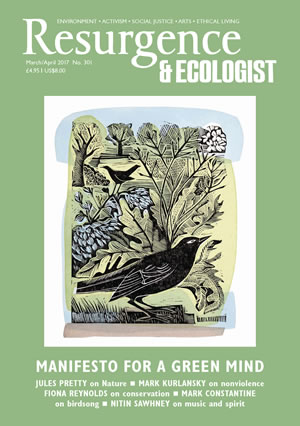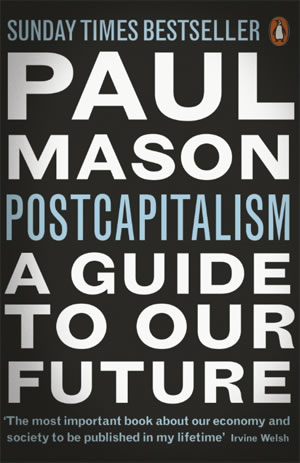Ever since standing outside Lehman Brothers in New York in 2008 on the morning it filed for bankruptcy, Paul Mason, former BBC and Channel 4 economics editor, has not shied from sharing his view that the global economic system is on the brink of collapse. His most recent book brings together his ideas under the title and neatly coined term Postcapitalism. Since its publication, he has taken his message round the country, from book festivals to Google HQ, with the energy of a Russian revolutionary’s agitprop train.
Mason’s central idea is that despite capitalism’s proven ability over the last 250 years to be a “complex adaptive system”, it has now exhausted its ability to adapt. Since 1989 when American political economist Francis Fukuyama declared “the end of history”, neoliberalism has scoured the globe for the cheapest resources, capital and labour to bring unprecedented and exponential growth through automation and, crucially, information technology.
From mapping the human genome to biogenetic revolution, in this digital age the rate of innovation is staggering. In just 15 years, according to the McKinsey Global Institute, global information flows have come to exert an influence on global GDP greater than centuries of capital flows in goods. Easily transferable labour has lost its power, but goods have become abundant.
Mason sees us moving rapidly towards a state where the effect of such abundance is that profits, the lifeblood of capitalism, are no longer easily achievable. We see this in interest rates that are heading below zero. The only reason the system hasn’t collapsed already, Mason contends, is through the printing of fiat money and debt-based economies. Power can only be held in markets through monopolies and artificial scarcity: only a widget or a lawyer, for example, can prevent the replication of an MP3 and thus maintain its price. IT’s ability to replicate itself for zero cost means corrosion of the price mechanism that is fundamental to the capitalist rationale.
What we effectively have is technology overtaking capitalism’s ability to adapt. Private control now adds up to a drag on growth and innovation. Capitalism has lost its mojo.
Work is modularising, and work and wages are rapidly becoming delinked. The Oxford Martin School says that 47% of all jobs will have been automated in the next 30 years. McJobs and person-to-person jobs – what the social anthropologist David Graeber calls “bullshit jobs” – are being created that don’t need to exist and are a further drain on innovation. All this is accompanied by the fragmentation of organisations, hierarchies and ownership.
The socialist and the geek in Mason revel in new forms of empowerment: “the educated and networked generation…that…will not tolerate paternalism and backwardness much longer”; “The highly complex, information-driven society will look very different from the revolutions of the 20th century” as geographically networked ‘swarms’ of people produce knowledge capital and ensure accountability that undermines profit. IT promises, Mason says, what the 20th-century experiment in socialism couldn’t deliver: abundance plus the data to create and regulate the global economy through the balanced ecology of an infinitesimally complex global network.
The vision seems vertiginous and Mason may fail to ground us entirely, but he doesn’t fail to stimulate as he trawls through a trove of economic history, from clues in Shakespeare to feudalism’s long transition into the new capitalist order, to Bogdanov’s 1908 utopian sci-fi novel Red Star. This may be indulgent to some, but it is worth hanging in with Mason’s lengthy re-evaluations of marginal Marxist analysis, which provide narrative context.
Marx’s prescient Fragment on Machines is invoked, in which the perfect machine “blows capitalism sky high”. Kondratiev’s ‘wave theory’ of 50-year cycles of capitalism in particular demonstrates how one phase adapts into the next – from the factory system to the railways and canals, through late-19th-century telephony and technological evolution into the post-war consensus of the social state.
Mason sees an impending paradigm shift in a globalised world. Just as the shock of the Black Death precipitated the transition in Europe from feudalism to capitalism, our own external shocks of climate change, alongside demographic explosions in population and migration, hammer home the urgency of economic evolution.
Mason proposes solutions ranging from benign economic instruments such as the carbon tariff system to a re-evaluation of personal motivation. Innovation must still be rewarded, but new ideas must soon become public capital. Economic growth will be based around the organic emergence of sophisticated global communities of networked individuals. Human potential will be liberated, not by the compulsion to work but through a universal social wage offering both security and the opportunity for self-actualisation.
While Mason claims to offer not a manual, but a framework around which to discuss a future global economic system, I would describe this attempt to bring together such a plethora of disparate threads in his thinking as more of a kaleidoscopic web. Given the revolutionary implications in this networked age, however, perhaps it must be so.
Ultimately, though, by raising as many questions as it asks, and with its central narrative somewhat elusive, this book cannot be said to be the Small Is Beautiful of our age. But it is compelling reading and it does attempt to go beyond Schumacher by proposing a paradigm shift in the global order, created by conscious design. Simply, the title Postcapitalism may mean that Mason has been prescient in giving a name to a theme that may increasingly dominate our discourse. The book’s subtitle, too, A Guide to Our Future, echoes Schumacher’s A Guide for the Perplexed. Like Schumacher, Mason is a visionary communicator with a mission who has come to the recognition that our shared interests are also our best interests as individuals. Progressive activism and environmentalism are not left out from his analysis, and are tasked to move beyond protest towards actually defining how a new world will be structured.
In getting us to look at the history of industrial organisation through the lens of history, perhaps this book offers hope that we can make objective choices to transition beyond our current system before we are struck by our own Black Death of carbon suffocation and demographic conflict.








